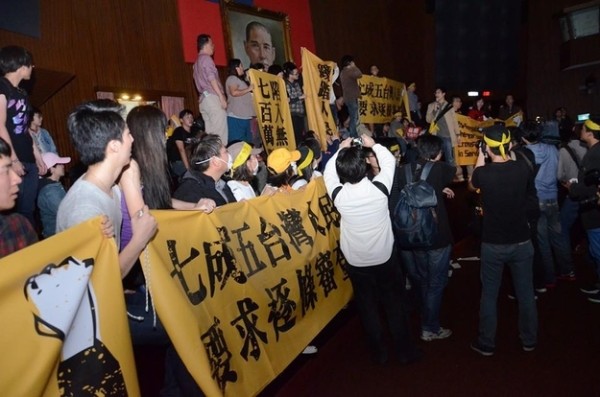Students and other mostly young protesters made the media as they held banners inside Taiwan’s legislature in Taipei, March 18, 2014. They burst into the Legislative Yuan late Tuesday and fought off police efforts to get them out.
Media aired video as the action by the students continued and the police tried to oust them but on the contrary the police were ousted by the students. Further police charges were met with barricaded doors and the physical lifting of police out of the chambers, while students made it over the stacked furniture to get inside.
Hundreds of protesters in Taiwan – a media estimated 2,000 was an early figure – showed their mettle in opposing a trade pact between island Taiwan and mainland China which they fear gives the mainland too much economic influence and access to jobs and business opportunities.
Later, the protesters clarified their three major points – appeared on Facebook:
1.Cancel the current agreement and restart negotiation.
2.The police should not enter into the Parliament, which should be owned by the public.
3.Before discussing any further agreement with China in the future, the Parliament should establish legal process for reviewing.
President Ma Ying-jeou was seen primarily responsible for the trade pact thus the demand was made that the initial review of the pact by the ruling Kuomintang (KMT) party be scrapped as the pact had been completed despite opposition party concerns.
Taiwan’s opposition Democratic Progressive Party, which has vowed to protect the island’s economy from any overbearing mainland China influence, has stated it would vote against the deal despite that it lacks the strength to block its passage.
Over the years both China mainland and island Taiwan have built up comprehensive economic ties. In February past they held their first direct government-to-government talks, which was a big step in expanding cross-strait dialogue that looked at issues beyond trade.
Mainland China is the island’s biggest trading partner and the two sides have signed many agreements on transport, tourism and easing trade restrictions since Taiwanese President Ma Ying-jeou took office in 2008.
China and Taiwan have been ruled separately since Nationalist forces, defeated by the Communists, fled to the island at the end of the Chinese civil war in 1949. China considers Taiwan a break-away province and has threatened the use of force to bring it back into the fold.
The students also see the pact would lead to mainland students crowding Taiwan universities, posing threats to local opportunities, scholarships and finally jobs. The actions by the students was unprecedented in Taiwan.










